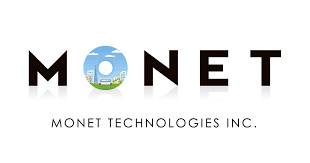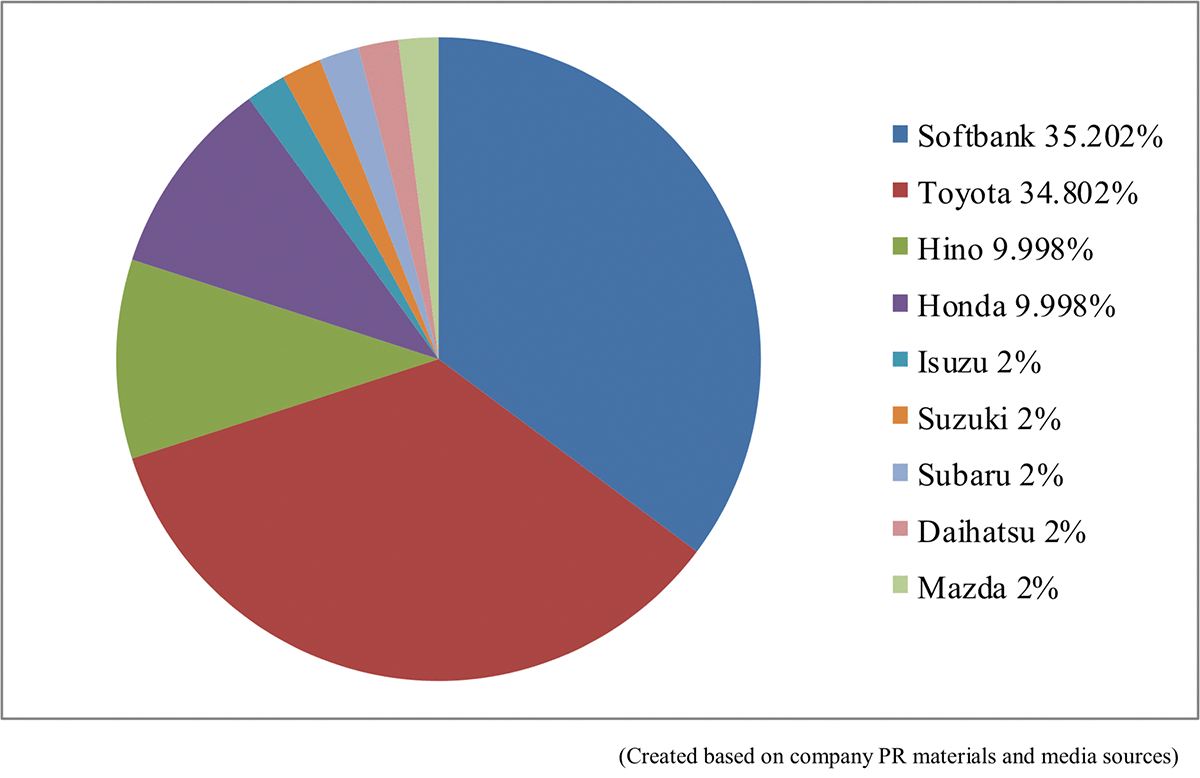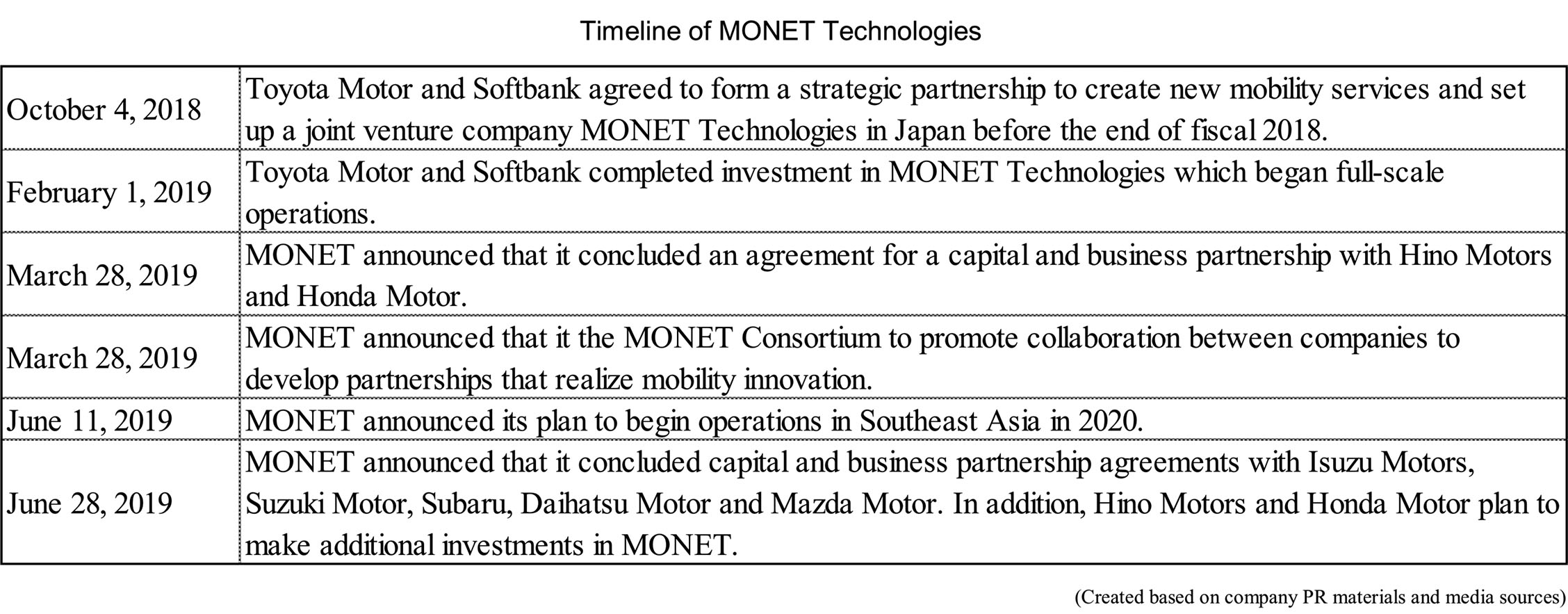AAA weekly
2019-12-23
Copyright FOURIN, Inc. 2025
Toyota and Softbank’s New Mobility Service MONET
The emergence of CASE (connected, autonomous, shared and electric) cars is changing the automotive industry. In February 2019, Japan’s largest automaker Toyota Motor and Japanese multinational conglomerate holding company Softbank Group launched MONET Technologies. The joint venture is involved in three business areas namely on-demand mobility services, data analysis services and autonomous mobility as a service (Autono-MaaS).
MONET, whose name combines the initial letters of “mobility” and “network,” is aimed to coordinate between Toyota’s Mobility Services Platform (MSPF), which is an information infrastructure developed by the company for connected cars, and Softbank’s Internet of Things (IoT) that generates new value from data acquired from smartphones and sensor devices. Ultimately, MONET is intended to launch Mobility-as-a- Service (MaaS) businesses which can address mobility issues and create new value. In the initial phase, MONET plans to provide vehicle dispatch services for local public and private entities in Japan. In fiscal 2018, MONET began demonstration test of a smartphone application-based car-sharing platform. As of February 2019, MONET was providing on-demand mobility services to 17 local governments and it is said to have been in talks with another 150 municipalities throughout Japan.

MONET was established in October 2018 and began operations in February of the following year. A month after its launch MONET announced that it concluded an agreement for a capital and business partnership with Hino Motors and Honda Motor. The two new partners each acquired a nearly 10 percent share in MONET. The partnership allows MONET to gain passenger and cargo mobility data that Hino collects from its buses and trucks, and mobility services data that Honda obtains from its passenger vehicles. The joint venture uses such data to further evolve its platform. In the same month, MONET announced the establishment of MONET Consortium which aims to promote next-generation mobility services, address social mobility issues and create new value through MaaS business development based on services that use autonomous vehicles. The consortium had 88 members on its launch day, which figure grew to 430 companies by November 2019. In June 2019, MONET announced that it concluded capital and business partnership agreements with Isuzu Motors, Suzuki Motor, Subaru, Daihatsu Motor and Mazda Motor. Each company invested in MONET and acquired 2 percent of its shares. The new partnerships will enable MONET to acquire data from its new partners on vehicles and mobility services for coordination with the MONET platform.
While these new partners and the three other automakers already involved in the joint venture remain competitors in the conventional vehicle sector, they must join forces to collect and analyze massive amounts data which are required for the development of autonomous vehicles and MaaS. Toyota’s self-driving vehicles, based on the e-Palette battery electric model that debuted at CES 2018, are intended to become the core of the service. The e-Palettes, which are the basis of MONET’s Autono-MaaS, will be initially limited to basic passenger and cargo transport services, but they will be eventually used for a variety of functions ranging from mobile offices and medical clinics to retail stores and hotel rooms. The service is scheduled to be debuted at the 2020 Olympics in Tokyo.
While services are planned to be first launched in Japan, MONET has announced its plan to begin operations in Southeast Asia as well in 2020. However, Softbank’s portfolio company Grab, a Singapore-based transportation network enterprise, which operates in eight countries in Southeast Asia, is already active in the region. It remains to be seen whether MONET and Grab will become competitors or collaborators in Southeast Asia.


Please
register or subscribe to view this report for free.
If you’re already a subscriber, sign in.
Credit card information is not needed for free trial registration.
You are eligible to view one report for free.
Additional reports require subscription.
 MONET was established in October 2018 and began operations in February of the following year. A month after its launch MONET announced that it concluded an agreement for a capital and business partnership with Hino Motors and Honda Motor. The two new partners each acquired a nearly 10 percent share in MONET. The partnership allows MONET to gain passenger and cargo mobility data that Hino collects from its buses and trucks, and mobility services data that Honda obtains from its passenger vehicles. The joint venture uses such data to further evolve its platform. In the same month, MONET announced the establishment of MONET Consortium which aims to promote next-generation mobility services, address social mobility issues and create new value through MaaS business development based on services that use autonomous vehicles. The consortium had 88 members on its launch day, which figure grew to 430 companies by November 2019. In June 2019, MONET announced that it concluded capital and business partnership agreements with Isuzu Motors, Suzuki Motor, Subaru, Daihatsu Motor and Mazda Motor. Each company invested in MONET and acquired 2 percent of its shares. The new partnerships will enable MONET to acquire data from its new partners on vehicles and mobility services for coordination with the MONET platform.
While these new partners and the three other automakers already involved in the joint venture remain competitors in the conventional vehicle sector, they must join forces to collect and analyze massive amounts data which are required for the development of autonomous vehicles and MaaS. Toyota’s self-driving vehicles, based on the e-Palette battery electric model that debuted at CES 2018, are intended to become the core of the service. The e-Palettes, which are the basis of MONET’s Autono-MaaS, will be initially limited to basic passenger and cargo transport services, but they will be eventually used for a variety of functions ranging from mobile offices and medical clinics to retail stores and hotel rooms. The service is scheduled to be debuted at the 2020 Olympics in Tokyo.
While services are planned to be first launched in Japan, MONET has announced its plan to begin operations in Southeast Asia as well in 2020. However, Softbank’s portfolio company Grab, a Singapore-based transportation network enterprise, which operates in eight countries in Southeast Asia, is already active in the region. It remains to be seen whether MONET and Grab will become competitors or collaborators in Southeast Asia.
MONET was established in October 2018 and began operations in February of the following year. A month after its launch MONET announced that it concluded an agreement for a capital and business partnership with Hino Motors and Honda Motor. The two new partners each acquired a nearly 10 percent share in MONET. The partnership allows MONET to gain passenger and cargo mobility data that Hino collects from its buses and trucks, and mobility services data that Honda obtains from its passenger vehicles. The joint venture uses such data to further evolve its platform. In the same month, MONET announced the establishment of MONET Consortium which aims to promote next-generation mobility services, address social mobility issues and create new value through MaaS business development based on services that use autonomous vehicles. The consortium had 88 members on its launch day, which figure grew to 430 companies by November 2019. In June 2019, MONET announced that it concluded capital and business partnership agreements with Isuzu Motors, Suzuki Motor, Subaru, Daihatsu Motor and Mazda Motor. Each company invested in MONET and acquired 2 percent of its shares. The new partnerships will enable MONET to acquire data from its new partners on vehicles and mobility services for coordination with the MONET platform.
While these new partners and the three other automakers already involved in the joint venture remain competitors in the conventional vehicle sector, they must join forces to collect and analyze massive amounts data which are required for the development of autonomous vehicles and MaaS. Toyota’s self-driving vehicles, based on the e-Palette battery electric model that debuted at CES 2018, are intended to become the core of the service. The e-Palettes, which are the basis of MONET’s Autono-MaaS, will be initially limited to basic passenger and cargo transport services, but they will be eventually used for a variety of functions ranging from mobile offices and medical clinics to retail stores and hotel rooms. The service is scheduled to be debuted at the 2020 Olympics in Tokyo.
While services are planned to be first launched in Japan, MONET has announced its plan to begin operations in Southeast Asia as well in 2020. However, Softbank’s portfolio company Grab, a Singapore-based transportation network enterprise, which operates in eight countries in Southeast Asia, is already active in the region. It remains to be seen whether MONET and Grab will become competitors or collaborators in Southeast Asia.



